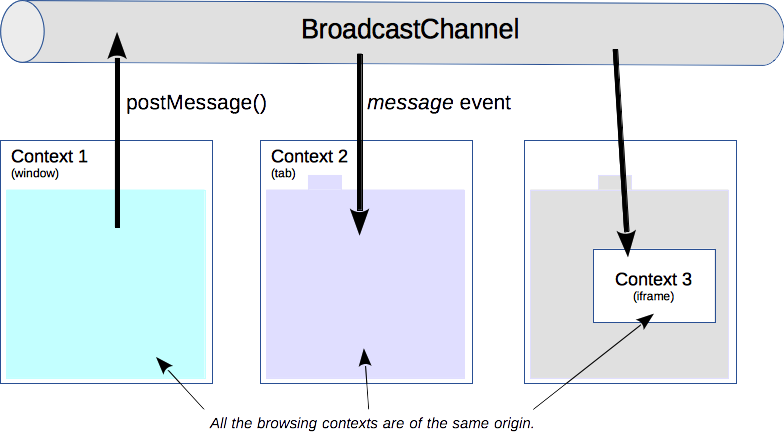JavaScript 如何实现同源通信?
在日常工作中,你可能会遇到同源页面间通信的场景。针对这种场景,我们可以使用 localStorage 和 storage 事件来解决同源页面间通信的问题。除此之外,我们还可以使用 Broadcast Channel API 来解决该问题。接下来,阿宝哥将带大家一起来认识一下 Broadcast Channel API。
一、Broadcast Channel API 简介
Broadcast Channel API 可以实现同源下浏览器不同窗口、Tab 页或者 iframe 下的浏览器上下文之间的简单通讯。通过创建一个监听某个频道下的 BroadcastChannel 对象,你可以接收发送给该频道的所有消息。

了解完 Broadcast Channel API 的作用之后,我们来看一下如何使用它:
// 创建一个用于广播的通信通道
const channel = new BroadcastChannel('my_bus');
// 在my_bus上发送消息
channel.postMessage('大家好,我是阿宝哥');
// 监听my_bus通道上的消息
channel.onmessage = function(e) {
console.log('已收到的消息:', e.data);
};
// 关闭通道
channel.close();通过观察以上示例,我们可以发现 Broadcast Channel API 使用起来还是很简单的。该 API 除了支持发送字符串之外,我们还可以发送其它对象,比如 Blob、File、ArrayBuffer、Array 等对象。另外,需要注意的是,在实际项目中,我们还要考虑它的兼容性:

由上图可知,在 IE 11 及以下的版本,是不支持 Broadcast Channel API,这时你就可以考虑使用现成的 broadcast-channel-polyfill 或者基于 localStorage 和 storage 事件来实现。
二、Broadcast Channel API 应用场景
利用 Broadcast Channel API,我们可以轻易地实现同源页面间一对多的通信。该 API 的一些使用场景如下:
- 实现同源页面间数据同步;
- 在其它 Tab 页面中监测用户操作;
- 指导 worker 执行一个后台任务;
- 知道用户何时登录另一个 window/tab 中的帐户。
为了让大家能够更好地掌握 Broadcast Channel API,阿宝哥以前面 2 个使用场景为例,来介绍一下该 API 的具体应用。
2.1 实现同源页面间数据同步
html
<h3 id="title">你好,</h3>
<input id="userName" placeholder="请输入你的用户名" />JS
const bc = new BroadcastChannel("abao_channel");
(() => {
const title = document.querySelector("#title");
const userName = document.querySelector("#userName");
const setTitle = (userName) => {
title.innerHTML = "你好," + userName;
};
bc.onmessage = (messageEvent) => {
if (messageEvent.data === "update_title") {
setTitle(localStorage.getItem("title"));
}
};
if (localStorage.getItem("title")) {
setTitle(localStorage.getItem("title"));
} else {
setTitle("请告诉我们你的用户名");
}
userName.onchange = (e) => {
const inputValue = e.target.value;
localStorage.setItem("title", inputValue);
setTitle(inputValue);
bc.postMessage("update_title");
};
})();在以上示例中,我们实现了同源页面间的数据同步。当任何一个已打开的页面中,输入框的数据发生变化时,页面中的 h3#title 元素的内容将会自动实现同步更新。
2.2 在其它 Tab 页面中监测用户操作
利用 Broadcast Channel API,除了可以实现同源页面间的数据同步之外,我们还可以利用它来实现在其它 Tab 页面中监测用户操作的功能。比如,当用户在任何一个 Tab 中执行退出操作后,其它已打开的 Tab 页面也能够自动实现退出,从而保证系统的安全性。
html
<h3 id="status">当前状态:已登录</h3>
<button onclick="logout()">退出</button>JS
const status = document.querySelector("#status");
const logoutChannel = new BroadcastChannel("logout_channel");
logoutChannel.onmessage = function (e) {
if (e.data.cmd === "logout") {
doLogout();
}
};
function logout() {
doLogout();
logoutChannel.postMessage({ cmd: "logout", user: "阿宝哥" });
}
function doLogout() {
status.innerText = "当前状态:已退出";
}在以上示例中,当用户点击退出按钮后,当前页面会执行退出操作,同时会通过 logoutChannel 通知其它已打开的页面执行退出操作。
三、Broadcast Channel API vs postMessage API
与 postMessage() 不同的是,你不再需要维护对 iframe 或 worker 的引用才能与其进行通信:
const popup = window.open('https://another-origin.com', ...);
popup.postMessage('Sup popup!', 'https://another-origin.com');Broadcast Channel API 只能用于实现同源下浏览器不同窗口、Tab 页或者 iframe 下的浏览器上下文之间的简单通讯。而 postMessage API 却可用于实现不同源之间消息通信。由于保证消息来自同一来源,因此无需像以前那样使用以下方法来验证消息:
const iframe = document.querySelector('iframe');
iframe.contentWindow.onmessage = function(e) {
if (e.origin !== 'https://expected-origin.com') {
return;
}
e.source.postMessage('Ack!', e.origin);
};四、总结
Broadcast Channel API 是一个非常简单的 API,内部包含了跨上下文通讯的接口。在支持该 API 的浏览器中,我们可以利用该 API 轻松地实现同源页面间的通信。而对于不支持该 API 的浏览器来说,我们就可以考虑使用 localStorage 和 storage 事件来解决同源页面间通信的问题。
五、参考资源
- MDN - Broadcast Channel API
- BroadcastChannel API: A Message Bus for the Web
